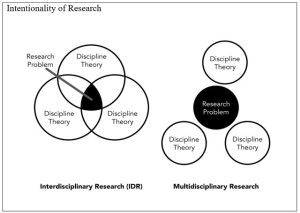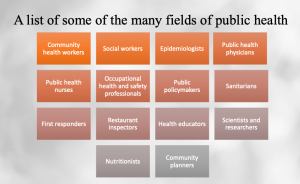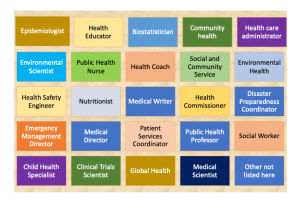Main Body
10 Careers in Public Health
Hector (Giovanni) Antunez
Learning Objectives
By the end of this chapter, the learner will be able to
-
Learn about the different types of public health careers
- List the most common and uncommon public health careers
- Learn about the public health certification and its current role in the proper identification of public health professionals and organizations.
- Learn about the future of public health in the U.S. and how having a public health degree can contribute to take public health to the next level in this century and the next.
- Provide a list of resources available for early or, middle career development, including leadership institutes/foundations, federal grants and other resources that are available to public health professionals
To understand the importance of public health – for which there is a chapter (see chapter 1) in this textbook dedicated at it, there is need to create a brief background that put into context, the issue of a career or careers in public health. Without the intention to bore the reader/student, the following content intents to review a central concept of public health and it is its interdisciplinary perspective.
Public health as an Interdisciplinary Field
 |
| Image: ‘multidisciplinary vs interdisciplinary’. Taken from an article about models for Developing Interdisciplinary Research.[1] Modify and create new figure later in the process.
|
Public health is made up of multiple fields of study, medicine, epidemiology, biology, chemistry, anthropology, geography, math and statistics, computer sciences, social sciences, philosophy, etc. The science is the 'discipline', and the intersection of knowledge/content is the essence of the word, interdisciplinary. There are multiple benefits to an interdisciplinary approach compared to a multidisciplinary, and probably the major benefit is that one branch of science/knowledge enhances the other, or, expands the application, or, just clarifies the discussion point, or, the definition.
To illustrate the points discussed above, watch the video of what is public health from the American Public Health Association and you will see the multidisciplinary work of public health.
| Watch this video from the American Public Health Association (APHA), What is Public Health?, Video from Video from APHA, what is public health?,Public Domain. |
Another way to see and understand how public health is an interdisciplinary science is by looking at the different areas of specialization or, expertise of public health occupations and careers. Just to make the point, a list of some of the many fields that are public health related are presented below:
 |
| Image created by Giovanni Antunez using MS PowerPoint. Licensed CC BY-SA 4.0 The list was prepared by using a web article from the American Public Health Association.[2] |
Listing the fields for career paths in public health
Without the intention to be completely exhausted, the following is a list of career paths in public health. Data was taken from a global search in the World Wide Web (WWW).
 |
| Image created by Giovanni Antunez using MS PowerPoint. Licensed CC BY-SA 4.0 The list was prepared by doing a Google search using the keywords: “public health as a career.” |
The hard part of this above list is to describe which job basically do, and of course, how much a professional in that area earn. Both are valid concerns. The following are the main descriptors associated with most of the jobs in the list above. [3]The sources of information for details vary and later in the chapter, the jobs will be presented as careers paths, which will increase the chances to earn higher salaries compared to those listed below.
Epidemiologist
In a nutshell, an epidemiologist has a a master’s degree in public health or a related field. The main responsibilities of an Epidemiologists is the identifications identify the major causes of disease, disability, and injury in populations and try to spot patterns. On average, the annual salary for this profession is $65,853.
Biostatistician
The minimum qualification for this type of job is a bachelor’s degree in biostatistics, statistics, or math, most of the time a master’s degree is preferred. Annual salary around $98,078.
Health care administrator
This type of career is under the general category of health services administration. In general, health service administrators plan, direct, and coordinate public health services and policies. The qualifications for this type of job is a bachelor’s degrees in health administration or a related field. A master’s degree preferred and/or previous work experience in a healthcare setting. The annual salary for this category is on average $68,422.
Health Educator
The main responsibilities of health educators is to teach/educate patients and communities in disease prevention, chronic disease management and wellness. Minimum qualification is a bachelor’s degree in health education or related field. In some cases, depending of the position, a master’s degree or a doctoral degree is required. Median annual salary $45.223.
Community health
Community health are very similar to the tasks mentioned above for a health educator with the addition that besides the care of individuals, the main focus is the community. Community health workers usually work with groups and communities promoting health and healthy living.
Health Coach
Very similar to a health educator or a community health worker.
Community health nurse
The main responsibilities of a community health nurse are, to improve the health of communities by educating at-risk populations about disease and illness. Community nurses typically provide restorative and rehabilitative care. Minimum requirements is an associate degree in nursing, or a nursing diploma from an accredited career institute. Preferred a bachelor of science in nursing. The average annual salary for this position is $68,925.
Public Health Nurse
Very similar to a community health nurse with the exception that in the majority of cases, a master’s degree in nursing is preferred. Besides the responsibilities described above for a community health nurse, in the case of a public health nurse, the position can be also administrative.
Environmental Scientist
Main responsibilities of this position is the study of environmental hazards affecting communities and the workplace, waste disposal management, pollution in general especially air and water pollution, and the overall impact of environmental hazards in human health, including animals. Mitigation and risk assessment/management is part of the job responsibilities. Degrees required include, a bachelor’s degree in environmental science, chemistry, geoscience, or a related field. Advanced positions in this field often require a master’s degree. Average annual salary is $59,860.
Environmental health
Very similar to an environmental scientist.
Nutritionist
The career in this case can be as a dietitian or a nutritionist, in either cases, the main responsibilities is to help individuals and communities to make healthier choices around food and the management of chronic diseases associated with nutrition. A bachelor’s degree in dietetics, food and nutrition, or a related field is typically required and in most states a license to practice is required. Annual salary is on average $56,796.
Medical Scientist
The main responsibilities for this type of job is the conduction of clinical trials to research human disease, test new treat4ement and overall improve health outcomes. Requirements, a master’s degree in clinical trials research, a Ph.D or a medical degree. The salary is an average of $65,102 annually.
Clinical trials Scientist
Very similar to a medical scientist, but very much focused on clinical trials’ work.
Global health
Commonly known also as International/Global health specialist. In general, international/global health professionals focus on improving human health and health standards in low and middle income countries (also known as developing countries.) Qualification is usually a master’s degree in international or public health. Salary on average is $83,610.
Additional public health career paths
In addition, the following are also additional career paths in public health with more or less variation depending on the main area of concentration: Social and Community Service Managers, Health safety engineer, Medical Writer, Health Commissioner, Disaster preparedness Coordinator, Emergency management Director, Medical Director, Patient services Coordinator, Professor, Social worker, Child health specialist, etc. More information about the career paths not listed in detail above will be provided in the rest of the content in this chapter.
Public Health Career Paths in Perspective
More than a job, it is important to think in terms of a career, which focuses more on the values and lifestyle of the individual beyond the monetary compensation. Part of the process to choose a career is to identify “your personal interests,” without forgetting other “Service Areas.” What does this mean?
Besides the list provided before, Identifying your Interests is important because the definition of a public health career is different for every person. No matter what your major interest is, there is a place for you in the field of public health. Areas of interest may include – some of them may appear repeated from previous content covered already, sociology, medicine, business, computer science, mathematics, engineering, anthropology, sociology, biology, history, etc. But also, consider the following Services areas in which a public health can be also used. These services areas include, Colleges and universities, Health care organizations, Nonprofits, Private sector companies, Government agencies, including State and local health departments or agencies, international humanitarian organizations, organizations affiliated with the United Nations, including the World Health Organizations of the Pan American Health Organization.[4]
The CDC approaches the two points mentioned above from another angle, in its webpage “See yourself in a public health career, ” What can I do in public health? an overview of options is presented. [5] See image below.
 |
| The image has a link at the top which does not work, but it is the https://www.bls.gov/ooh/
“See yourself in public health“, screenshot image from a CDC webpage, Public Domain. |
In the CDC approach to a career in public health, it is recommended to ask three questions: What degree should I get?, How do I begin a career in public health? and Where can I work in public health? In a way, some of these answers have been responded already in the previous content of this book. But there is a benefit of going through them in more detail.
Frequently, a student thinking on going into public health ask: What degree should I get? Since public health is such an open degree, essentially there is no pre-requesite educational degree to work in public health, which means, the student planning to go into a graduate level or master’s in public health don’t need to have an undergraduate degree in public health, although there are some universities in the U.S. offering undergraduate degrees in public health. That said, the most common graduate degree is the Master of Public Health. Others include, but are not limited to, a Master of Health Administration, Master of Science, and Master of Health Science. These degrees are offered by universities and schools accredited by the Council on Education for Public Health. [6]
How do I begin a career in public health? There is no specific way to know how to start a public health career, most people who are in public health now did not know that they would ended up working in public health. On the other hand, there are people who knew since the beginning that what they wanted was a career in public health. Either way, those examples show that there are may pathways that can lead to a career in public health. It is important to study the many options available. Although not everyone who study public did it because they wanted to work at CDC, a good start for exploring career paths is the CDC, Learn more Career Fields at CDC.[7]
Listening to real people and their careers in public health
Watch these two short videos from a CDC epidemiologist describing his work. The following is Part I, and after that, there is Part II.
| Hear from Wade, a real CDC epidemiologist, as he describes what he does, what he studied in school, and the skills he uses in his daily work. Video from CDC Science Ambassador Program.[9],Public Domain. |
| Download the transcript. |
| Hear from Wade, a real CDC epidemiologist, as he describes his career path and how he works with other STEM professionals to help people stay healthy. Video from CDC Science Ambassador Program.[10],Public Domain. |
| Download the transcript. |
A behavioral Scientist
To have another perspective, let’s watch the following video about the work of a Behavioral Scientist (who is closer to a community health worker training in behavioral health). Who is a behavioral scientist? A behavioral scientist studies why people behave the way they do and what factors influence their decisions and behaviors.
| Hear from Laura, a real CDC behavioral scientist, as she describes what she does, what she studied in school, and the skills she uses in her daily work.
Video from CDC Science Ambassador Program.[11],Public Domain. |
| Download the transcript. |
Public Health Nurse
A public health nurse plays a vital role in disease prevention and promoting community health and safety. They look at health trends and risk factors and work to improve access to health services. They also help design and implement health education campaigns and disease prevention activities.
| Hear from Augustina, a real CDC nurse consultant, as she describes what she does, what she studied in school, and the skills she uses in her daily work. Video from CDC Science Ambassador Program.[12],Public Domain. |
To watch more videos similar to this, just follow the link from the CDC Ambassador Program.
Another way to look at the careers in public health is presented from the American Public Health Association (APHA) in “Who is public health?” A spotlight on volunteers who give time to grow the public health movement in the United States.[13] Click for the testimonies here.
 |
| A screen shot of how the who is public health webpage looks like. APHA website. Fair Use. |
- Cohen-Miller, A., Pate, E. (2019). A Model for Developing Interdisciplinary Research Theoretical Frameworks. Qualitative Report, 24(6):1211-1226. DOI:10.46743/2160-3715/2019.3558 ↵
- American Public Health Association (APHA). (n.d.). What is Public Health? From https://www.apha.org/What-is-Public-Health ↵
- Monster. (n.d.). 12 Public Health Careers Where You Can Make a Difference. From https://www.monster.com/career-advice/article/public-health-careers ↵
- University of Pittsburg, School of Public Health. (n.d.). Careers in Public Health. From https://www.sph.pitt.edu/careers/careers-public-health ↵
- CDC. (n.d.). See Yourself in a Public Health Career. From https://www.cdc.gov/stem/careers/index.html ↵
- Association of Schools & Programs in Public Health (ASPPH). (n.d.). About ASPPH. From https://aspph.org/about/ ↵
- CDC. (n.d.). Career Fields Overview. From https://jobs.cdc.gov/career-fields/ ↵
- CDC. (n.d.). Where can I work in public health? See Yourself in a Public Health Career. From https://www.cdc.gov/stem/careers/index.html ↵
- CDC Science Ambassador program. (n.d.). Public Health Careers, Epidemiologist [Video]. From https://www.cdc.gov/scienceambassador/nerdacademy/careers.html ↵
- CDC Science Ambassador program. (n.d.). Public Health Careers, Epidemiologist [Video]. From https://www.cdc.gov/scienceambassador/nerdacademy/careers.html ↵
- CDC Science Ambassador program. (n.d.). Public Health Careers, Behavioral Scientist [Video]. From https://www.cdc.gov/scienceambassador/nerdacademy/careers.html ↵
- CDC Science Ambassador program. (n.d.). Public Health Careers, Public Health Nurse [Video]. From https://www.cdc.gov/scienceambassador/nerdacademy/careers.html ↵
- American Public Health Association (APHA).(n.d.) "Who is public health?" A spotlight on volunteers. From https://www.apha.org/What-is-public-health/Who-is-public-health ↵
The science is the 'discipline,' a kind of old word used to refer to a specific area of science. The other way in which people commonly use the word 'discipline' is when "kids need discipline," but it is not the use in the context of this book.
This term is probably originated from the mathematics concept of Venn Diagrams in which, the point or region/space in which three or, more circles [or, any other geometric figure] met (or, intersect) refers to the commonality in 'content.'
